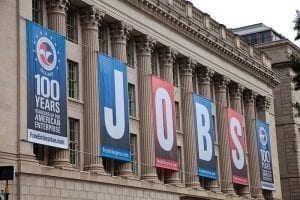If you haven’t been laid off but can’t work for reasons related to COVID-19, such as that you’ve become infected with the virus or are caring for someone who is, or you have child care needs related to COVID-19, you may have a right to sick leave benefits.
Shutdowns of businesses across the nation due to COVID-19 have caused a massive share of the U.S. workforce to become unemployed. In April 2020 alone, the U.S. economy lost 20.5 million jobs, bringing the overall unemployment rate to 14.7%. In contrast, unemployment in February had reached the record-low of 3.5%. The current unemployment rate is officially the worst since the Great Depression, and is unlikely to improve soon.
Fortunately, for most individuals laid off due to COVID-19, help is available. Workers laid off due to COVID-19 are often entitled to unemployment benefits from both the state and federal governments to help them get by while they wait for the health of both the nation and the economy to improve.
How can workers laid off due to COVID-19 apply for unemployment benefits? Workers who have been laid off or furloughed should apply for unemployment benefits through their state’s labor and employment department. This is the starting point for obtaining both state and federal unemployment benefits. State offers unemployment benefits in varying amounts and for varying lengths of time, and not all workers are eligible to receive the maximum unemployment benefit. These payments will vary based on the rates in your state, the amount of time you worked before getting laid off or furloughed, and your hourly rate or salary prior to losing your job. In some cases, workers who have had their hours reduced may also qualify for unemployment benefits. You can find additional information on applying for unemployment benefits in your state by visiting the CareerOneStop.org website, or your state’s labor and employment website.

What will unemployed workers receive in benefits? In addition to benefits provided by your state’s unemployment office, the federal CARES Act offers supplemental benefits for those who are currently out of work. The CARES Act provides for $600 in additional funds for those laid off or furloughed on top of any state benefits. This additional $600 is currently scheduled to last until July, but a new bill currently before Congress would extend the additional relief until December. The CARES Act also offers an extension of 13 weeks of unemployment benefits beyond what your state would provide if you’re still out of work when state benefits run out.
What about workers in the “gig economy”? Independent contractors, freelancers, or other “gig” workers are normally unable to receive unemployment benefits. Under the CARES act, however, workers in the gig economy have become eligible for unemployment benefits for up to 39 weeks under the Pandemic Unemployment Assistance program, or “PUA.” Others who are entitled to collect benefits under the PUA include those with a limited work history and those who have exhausted the right to regular or extended unemployment benefits. A labor and employment attorney can help you determine if you’re entitled to these benefits under the PUA.
If you haven’t been laid off but can’t work for reasons related to COVID-19, such as that you’ve become infected with the virus or are caring for someone who is, or you have child care needs related to COVID-19, you may have a right to sick leave benefits. The Families First Coronavirus Response Act (FFCRA) requires that most private employers with fewer than 500 employees are required to offer up to two weeks of fully or partially-paid sick leave for workers who are under quarantine, are experiencing symptoms of the virus, are caring for a child whose school or daycare is closed, are caring for a family member under quarantine or experiencing symptoms, or is experiencing any “substantially-similar condition.”
Even if unemployment is unavailable, most Americans are eligible for federal stimulus payments that can help alleviate the burden.


Join the conversation!